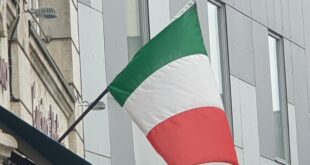The former European Parliament president, Martin Schulz, is to be the candidate of the Germany’s Social Democratic Party (SPD) in its bid to unseat Chancellor Angela Merkel in this year’s election.
Schulz should be officially confirmed at a meeting on Sunday, after the party’s leader, Sigmar Gabriel decided to stand aside.
The SPD has been in government with Merkel’s Christian Democratic Union (CDU) since 2013, with Gabriel as vice-chancellor and economy minister.
It will attempt to gather enough support to lead a different coalition after the vote, which will likely take place on 24 September.
The 61-year old Schulz is more popular than Gabriel, but has a slim chance of beating Merkel at the ballot box, however.
A recent poll by the Emnid institute for the mass circulating daily newspaper Bild said that in a direct vote Schulz would win 38 percent against 39 percent for Merkel.
It said Gabriel would only receive 27 percent of the votes against 46 percent for Merkel.
Merkel’s CDU party leads the SPD by an average 15 percentage points, according to other polls cited by the Reuters news agency.
At a joint news conference in the SPD headquarters in Berlin on Tuesday (24 January), Gabriel praised Schulz for taking a tough stance against right-wing populism across Europe, and said he would fight for social justice and democracy.
Schulz said he would fight the easy solutions offered by populists and extremists.
“With me, there will be no Europe bashing. There will be no hounding of minorities,” he said, adding that Germany needed a new leadership in difficult times.
EU credentials
Schulz once wanted to be a footballer and later sold books in Aachen, a German town. Before moving to Brussels, he served as the mayor of the town of Wuerselen near the French border.
He announced in November that he would return to German politics. A member of the European Parliament since 1994, he is a relatively fresh face in German national politics.
He grabbed media attention when former Italian prime minister Silvio Berlusconi likened him to a Nazi camp supervisor in 2003.
He became the EU parliament president in 2012, helping to make it into a more forceful and visible political actor in Brussels.
In 2014, he also ran, unsuccessfully, against former Luxembourg leader Jean-Claude Juncker to become president of the European Commission.
Ironically, while Gabriel feels politically tainted by the grand coalition he helped to steer with the centre-right in Berlin, Schulz was instrumental in building a grand coalition between the centre-right European People’s Party (EPP) and the Socialists in Brussels.
Schulz’s European credentials might also be his weak spot.
The leader of the far-right party Alternative for Germany (AfD), Frauke Petry, said on Twitter about Schulz: “Symbol of EU bureaucracy and a deeply divided Europe as chancellor candidate?”.
Gabriel will soon step down as economy minister and become foreign minister, while the current SPD foreign affairs chief, Frank-Walter Steinmeier, will become Germany’s president.
Europe’s strongest leader, Merkel, who is running for a fourth term, still seems untouchable.
But she has come under fire from the right over migration, with the CDU’s Bavarian sister party, the CSU, threatening to run separately, and the far-right AfD gaining momentum while criticising Merkel for welcoming refugees.
Eszter Zalan
 THE AFRICAN COURIER. Reporting Africa and its Diaspora! The African Courier is an international magazine published in Germany to report on Africa and the Diaspora African experience. The first issue of the bimonthly magazine appeared on the newsstands on 15 February 1998. The African Courier is a communication forum for European-African political, economic and cultural exchanges, and a voice for Africa in Europe.
THE AFRICAN COURIER. Reporting Africa and its Diaspora! The African Courier is an international magazine published in Germany to report on Africa and the Diaspora African experience. The first issue of the bimonthly magazine appeared on the newsstands on 15 February 1998. The African Courier is a communication forum for European-African political, economic and cultural exchanges, and a voice for Africa in Europe.
































